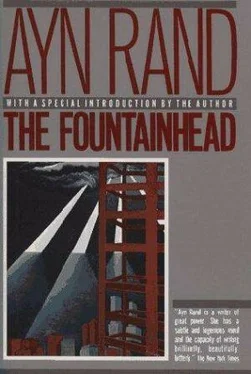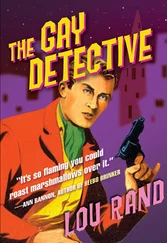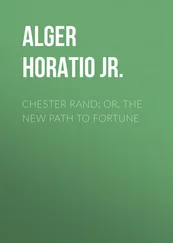"You had better give in."
He made a step back. It was not a wall behind him. It was only the side of his chair.
He thought of the moment in his bedroom when he had almost pulled a trigger. He knew he was pulling it now.
"All right," he said.
It's only a bottle cap, thought Wynand looking down at a speck of glitter under his feet; a bottle cap ground into the pavement. The pavements of New York are full of things like that — bottle caps, safety pins, campaign buttons, sink chains; sometimes — lost jewels; it's all alike now, flattened, ground in; it makes the pavements sparkle at night. The fertilizer of a city. Someone drank the bottle empty and threw the cap away. How many cars have passed over it? Could one retrieve it now? Could one kneel and dig with bare hands and tear it out again? I had no right to hope for escape. I had no right to kneel and seek redemption. Millions of years ago, when the earth was being born, there were living things like me: flies caught in resin that became amber, animals caught in ooze that became rock. I am a man of the twentieth century and I became a bit of tin in the pavements, for the trucks of New York to roll over.
He walked slowly, the collar of his topcoat raised. The street stretched before him, empty, and the buildings ahead were like the backs of books lining a shelf, assembled without order, of all sizes. The comers he passed led to black channels; street lamps gave the city a protective cover, but it cracked in spots. He turned a corner when he saw a slant of light ahead; it was a goal for three or four blocks.
The light came from the window of a pawnshop. The shop was closed, but a glaring bulb hung there to discourage looters who might be reduced to this. He stopped and looked at it. He thought, the most indecent sight on earth, a pawnshop window. The things which had been sacred to men, and the things which had been precious, surrendered to the sight of all, to the pawing and the bargaining, trash to the indifferent eyes of strangers, the equality of a junk heap, typewriters and violins — the tools of dreams, old photographs and wedding rings — the tags of love, together with soiled trousers, coffee pots, ash trays, pornographic plaster figures; the refuse of despair, pledged, not sold, not cut off in clean finality, but hocked to a stillborn hope, never to be redeemed. "Hello, Gail Wynand," he said to the things in the window, and walked on.
He felt an iron grate under his feet and an odor struck him in the face, an odor of dust, sweat and dirty clothing, worse than the smell of stockyards, because it had a homey, normal quality, like decomposition made routine. The grating of a subway. He thought, this is the residue of many people put together, of human bodies pressed into a mass, with no space to move, with no air to breathe. This is the sum, even though down there, among the packed flesh, one can find the smell of starched white dresses, of clean hair, of healthy young skin. Such is the nature of sums and of quests for the lowest common denominator. What, then, is the residue of many human minds put together, unaired, unspaced, undifferentiated? The Banner, he thought, and walked on.
My city, he thought, the city I loved, the city I thought I ruled.
He had walked out of the board meeting, he had said: "Take over, Alvah, until I come back." He had not stopped to see Manning drunk with exhaustion at the city desk, nor the people in the city room, still functioning, waiting, knowing what was being decided in the board room; nor Dominique. Scarret would tell them. He had walked out of the building and gone to his penthouse and sat alone in the bedroom without windows. Nobody had come to disturb him.
When he left the penthouse, it was safe to go out: it was dark. He passed a newsstand and saw late editions of the afternoon papers announcing the settlement of the Wynand strike. The Union had accepted Scarret's compromise. He knew that Scarret would take care of all the rest. Scarret would replate the front page of tomorrow's Banner. Scarret would write the editorial that would appear on the front page. He thought, the presses are rolling right now. Tomorrow morning's Banner will be out on the streets in an hour.
He walked at random. He owned nothing, but he was owned by any part of the city. It was right that the city should now direct his way and that he should be moved by the pull of chance corners. Here I am, my masters, I am coming to salute you and acknowledge, wherever you want me, I shall go as I'm told. I'm the man who wanted power.
That woman sitting on the stoop of an old brownstone house, her fat white knees spread apart — the man pushing the white brocade of his stomach out of a cab in front of a great hotel — the little man sipping root beer at a drugstore counter — the woman leaning over a stained mattress on the sill of a tenement window — the taxi driver parked on a corner — the lady with orchids, drunk at the table of a sidewalk cafe — the toothless woman selling chewing gum — the man in shirt sleeves, leaning against the door of a poolroom — they are my masters. My owners, my rulers without a face.
Stand here, he thought, and count the lighted windows of a city. You cannot do it But behind each yellow rectangle that climbs, one over another, to the sky — under each bulb — down to there, see that spark over the river which is not a star? — there are people whom you will never see and who are your masters. At the supper tables, in the drawing rooms, in their beds and in their cellars, in their studies and in their bathrooms. Speeding in the subways under your feet. Crawling up in elevators through vertical cracks around you. Jolting past you in every bus. Your masters, Gail Wynand. There is a net — longer than the cables that coil through the walls of this city, larger than the mesh of pipes that carry water, gas and refuse — there is another hidden net around you; it is strapped to you, and the wires lead to every hand in the city. They jerked the wires and you moved. You were a ruler of men. You held a leash. A leash is only a rope with a noose at both ends.
My masters, the anonymous, the unselected. They gave me a penthouse, an office, a yacht. To them, to any one of them who wished, for the sum of three cents, I sold Howard Roark.
He walked past an open marble court, a cave cut deep into a building, filled with light, spurting the sudden cold of air-conditioning. It was a movie theater and the marquee had letters made of rainbows: Romeo and Juliet. A placard stood by the glass column of the box office: "Bill Shakespeare's immortal classic! But there's nothing highbrow about it! Just a simple human love story. A boy from the Bronx meets a girl from Brooklyn. Just like the folks next door. Just like you and me."
He walked past the door of a saloon. There was a smell of stale beer. A woman sat slumped, breasts flattened against the table top. A juke box played Wagner's "Song to the Evening Star," adapted, in swing time.
He saw the trees of Central Park. He walked, his eyes lowered. He was passing by the Aquitania Hotel.
He came to a corner. He had escaped other corners like it, but this one caught him. It was a dim corner, a slice of sidewalk trapped between the wall of a closed garage and the pillars of an elevated station. He saw the rear end of a truck disappearing down the street. He had not seen the name on it, but he knew what truck it was. A newsstand crouched under the iron stairs of the elevated. He moved his eyes slowly. The fresh pile was there, spread out for him. Tomorrow's Banner.
He did not come closer. He stood, waiting. He thought, I still have a few minutes in which not to know.
He saw faceless people stopping at the stand, one after another. They came for different papers, but they bought the Banner also, when they noticed its front page. He stood pressed to the wall, waiting. He thought, it is right that I should be the last to learn what I have said.
Читать дальше










